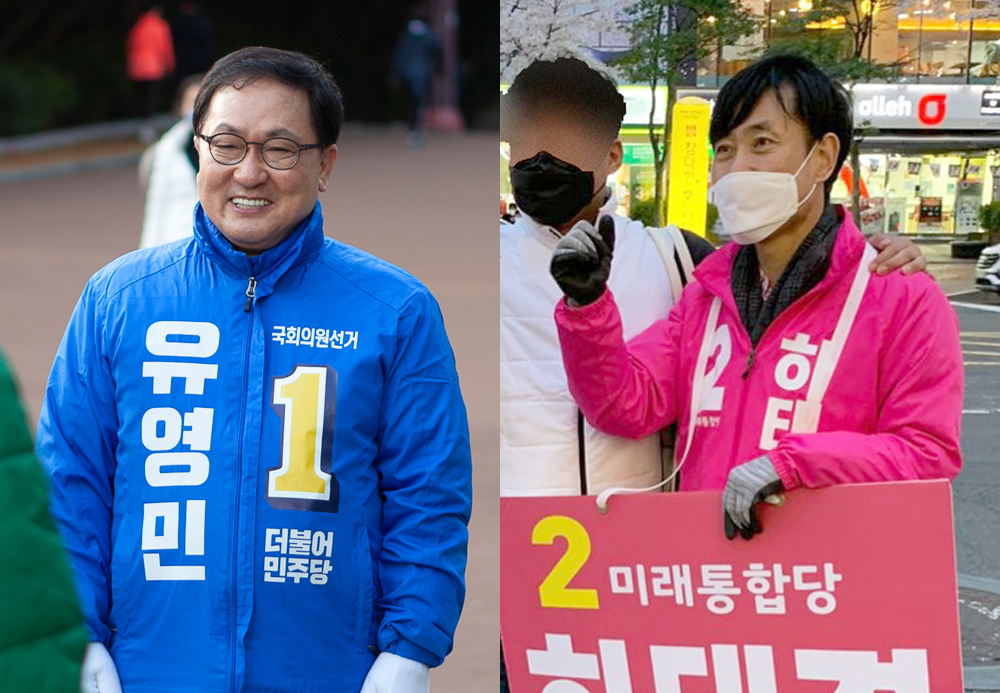Parties head for showdown in polls over coronavirus handling
By Park Han-naPublished : March 29, 2020 - 16:40

With rival political groups set to go head to head in the April parliamentary elections, the Moon Jae-in administration’s handling of the COVID-19 outbreak is dominating election campaigns.
The outbreak has killed at least 152 people in South Korea and infected 9,583 so far.
The conservative opposition United Future Party is urging voters to pass judgment on the “failed” response of President Moon Jae-in and his ruling camp, while the liberal bloc is pinning hopes on a recent rebound in public sentiment.
The governing Democratic Party highlights the need for political stability at a time when the nation is facing an unprecedented public health crisis.
“We will fulfill our obligations to take successful containment measures in order to save lives and minimize the economic impact,” Yoon Ho-jung, the secretary-general of the party, said during a press conference Sunday.
The ruling party announced its secondary election slogan -- “The war against the coronavirus must to be won” -- to play up the government’s measures, which have attracted public support here and praise from abroad.
The party says it aims to secure 130 directly elected slots, as well as 17 proportional representation spots through its satellite party, the citizens’ party, to win 147 of the 300 seats in the National Assembly.
Currently, the ruling party controls 121 seats in the unicameral parliament, which is the largest bloc but falls far short of a majority.
“We will carry out reforms that we couldn’t complete in a situation where the ruling party and liberal bloc didn’t secure a majority,” Yoon said. One of Moon’s signature overhaul plans that has made headway is checking the prosecution’s investigative power and sharing some of that power with the police.
Maintaining its position as the largest bloc would enable the Democratic Party to support President Moon’s reform initiatives until he completes his term.
The main opposition United Future Party, also aiming for 147 seats with its satellite party, calls for a conservative resurgence in the upcoming election after conservative President Park Geun-hye was impeached due to an influence-peddling scandal in 2017.
It says the liberals must be held accountable for “missteps” in their handling of the coronavirus situation and for their “failed” economic policies.
Kim Jong-in, head of the United Future Party’s election task force, said Sunday that his party will present emergency economic plans to deal with the fallout from the respiratory virus within a month after the 21st parliament holds its first session in June.
He suggested setting aside 100 trillion won ($81.9 billion) from this year’s 512 trillion won budget to help save the economy.
“An emergency economic plan for COVID-19 should be focused on making up for small companies and self-employed workers and wages for them in a direct, immediate and persistent manner until the disastrous situation ends,” he said during a press conference.
In January and February, the conservative bloc seemed to have the upper hand ahead of the election when it succeeded in forming a coalition of divided parties and over 760,000 people signed a petition calling for a ban on visitors from China amid growing fear that the coronavirus could spread.
But public sentiment, which had been unfavorable toward the Moon government’s early containment efforts, has turned a corner as COVID-19 cases in countries that imposed tough bans on Chinese people, including the US, surged in March.
In a Gallup Korea survey last week, 37 percent of respondents said they would vote for the Democratic Party, followed by 22 percent for the United Future Party and 5 percent for the minor progressive Justice Party. The public approval rating for President Moon stood at 55 percent, the highest level in 16 months.
According to the National Election Commission, a total of 1,118 candidates have registered to run for 253 electoral districts while 312 candidates will vie for 17 proportional representation seats.
By Park Han-na (hnpark@heraldcorp.com)











![[Today’s K-pop] BTS pop-up event to come to Seoul](http://res.heraldm.com/phpwas/restmb_idxmake.php?idx=644&simg=/content/image/2024/04/17/20240417050734_0.jpg&u=)





![[KH Explains] Hyundai's full hybrid edge to pay off amid slow transition to pure EVs](http://res.heraldm.com/phpwas/restmb_idxmake.php?idx=652&simg=/content/image/2024/04/18/20240418050645_0.jpg&u=20240418181020)

![[Today’s K-pop] Zico drops snippet of collaboration with Jennie](http://res.heraldm.com/phpwas/restmb_idxmake.php?idx=642&simg=/content/image/2024/04/18/20240418050702_0.jpg&u=)